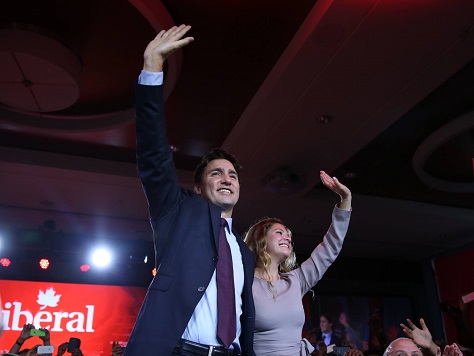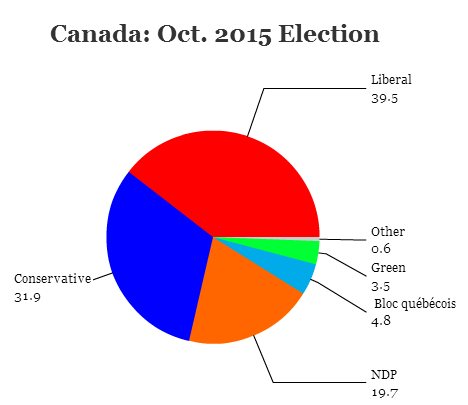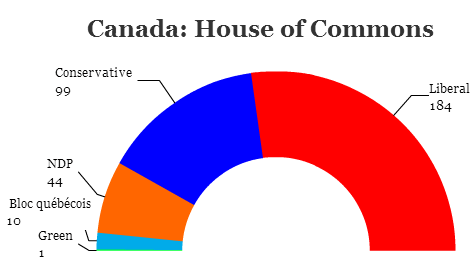Defying expectations in August that pitted the Liberal Party in third place at the beginning of the election campaign in August, Justin Trudeau has now won a clear majority government and a mandate for change in Canada’s 42nd federal election.![]()
So what does that mean for Canada, for US-Canadian relations and for Canada’s role in the world in the weeks and months ahead?
Here are nine policy areas to keep an eye on as Trudeau begins the rapid transition to 24 Sussex Drive, appoints a cabinet and tackles a full agenda of issues that could dominate what will likely be a full four-year term with the kind of parliamentary mandate that should make it much more easier than Trudeau ever expected to enact his policy preferences.
Climate change. As the Paris summit on climate change approaches in November, Canada’s government will go from being one of the most skeptical participants at the conference to one of the most enthusiastic supporters of action to reduce carbon emissions. Keep an eye on Stéphane Dion, the former Liberal leader from 2006 and 2008 and a former environmental minister, to play a vocal and supportive role. Nevertheless, global climate change policy is mostly set by the G-2 — i.e., the United States and China. So Trudeau’s role at the summit, while productive, will be more about style than any actual substance. Joyce Murray, a popular left-wing MP and British Columbia’s former environmental minister, who was the runner-up to Trudeau in the 2013 Liberal contest, is also a rising star to watch on environmental matters.
Economic policy. At the start of the campaign, the traditionally more centrist Liberals advanced a tax policy to the left of the New Democratic Party (NDP) by promising a middle-class tax cut to be paid for by slightly higher taxes on those who earn roughly more $200,000 annually. During the campaign, as Canada officially slipped into a shallow recession, Trudeau doubled-down by pledging to engage in deficit spending over the next three years to stabilize Canada’s economy, protect jobs and boost infrastructure. It was this move, again outflanking the NDP (whose leader Thomas Mulcair promised to maintain the Conservative Party’s devotion to balanced budgets), that may have convinced voters that Trudeau, and not Mulcair, represented the most striking contrast with Conservative prime minister Stephen Harper.
Ralph Goodale, a former finance minister under Paul Martin; Bill Morneau, a 52-year-old newcomer first elected last night from the Toronto’s business world and Scott Brison, a former Progressive Conservative MP who defected to the Liberals over a decade ago, could all be leading contenders for finance minister.
Keystone XL (and other pipelines). Despite leading a government that will be much more skeptical of the oil industry and much more welcoming to environmental interests, Trudeau has repeatedly said that he favors the Keystone XL project. Furthermore, he has pledged to work with US president Barack Obama to ameliorate any environmental concerns involved with approving the fourth and final phase of the TransCanada pipeline, which would ship oil directly from Alberta to Nebraska. As Obama’s final year in the White House approaches, a partnership with Trudeau on Keystone XL could boost warmer relations and remove a politically tricky issue from the 2016 US presidential election. Over the course of Trudeau’s government, though, he will also have to consider the alternative Energy East pipeline, which will transform a cross-continental natural gas line into an oil line running from Alberta to the Atlantic coast in New Brunswick. Trudeau has not provided a definitive position on Energy East, deferring that the most affected communities should decide its outcome.
Trans-Pacific Partnership. Mulcair used the last week of the campaign to savage the massive 12-country free trade agreement negotiations for which the Harper government only finalized earlier this month. It didn’t seem to matter. Trudeau has taken a generally pro-trade stand as Liberal leader and, though he has voiced concerns about some of the more problematic aspects of the TPP, there’s every reason to believe that Trudeau will continue to push for the TPP’s enactment. Bob Rae, the former interim Liberal leader between 2011 and 2013, is no longer a member of parliament, but he has been mentioned as a possible ambassador to either the United Nations or the United States.
Senate reform. If Harper stays true to his word, he will leave office with 22 open vacancies in the troubled and scandal-ridden Senate, the upper house of the Canadian parliament. Harper was already facing legal challenges over his ‘no new appointments’ stand for Senate reform. Trudeau, too, wants to reform the Senate by instituting a nonpartisan appointment process, and he previously expelled Liberal senators from the parliamentary caucus (they now, officially, sit in the Senate as independents). But will have to make a decision soon about the practical consequences, and he may be politically powerful enough to grandfather in one last wave of Liberal-friendly senators.
Civil liberties. Trudeau reluctantly supported Harper’s anti-terrorism Bill C51 earlier this summer, and the NDP quickly pounced on it as evidence that Trudeau was essentially Harper-lite on the matter of civil liberties. With a powerful majority in the House, however, Trudeau now has the means to carry through his promise to limit some of the rougher edges of the anti-terrorism laws, so it will be worth watching to see if the Liberals expend any political capital to revisit the issue.
Sovereignty and the national question. Despite an unwieldy caucus that drew heavily from Alberta and the prairie provinces, Harper managed to preside over nine years that cooled passions on Canada’s ‘national’ question. Even when Québec’s separatists led a short-lived minority government for 17 months in 2012 and 2013, Harper refused to be baited into a fight over federalism. Throughout his time in office, Harper routinely accommodated Québec — formally acknowledging Québec as a ‘nation’ in 2006 and later handing over federal funds to premier Jean Charest that he then used to enact provincial tax cuts. Though Trudeau’s father presided over a tumultuous period for Canadian identity, there’s every expectation that the son will face a much more united Canada. The relationship with Québec premier Philippe Couillard will not necessarily be easy — though Couillard comes from the Parti libéral du Québec (PLQ, Liberal Party of Québec), the provincial Liberals are not affiliated with the federal Liberals. Moreover, Kathleen Wynne, Ontario’s premier and the leader of the Liberal Party of Ontario, was a much more vocal ally of Trudeau during the campaign, while Couillard (a former ministerial colleague of Mulcair when both served in Charest’s provincial goverment) kept his distance.
All things Syria. Trudeau could change Canada’s policy on at least two areas that touch and concern the ongoing civil war in Syria. In contrast to the Harper government, Trudeau favors admitting 25,000 Syrian refugees to Canada (15,000 more than Harper committed to resettling). When those refugees arrive, they will find that their government, unlike the Harper government, isn’t really interested in forcing Muslim women to remove the niqab. But Trudeau has also mocked Harper’s willingness to engage Canadian military force in the fight against ISIS, at one point mocking Harper for ‘trying to whip out our CF-18s and show them how big they are.’ Trudeau might yet find that he favors an ongoing role in the US- and NATO-led fight against ISIS. For now, though, expect a much more reluctant Canadian role in the Middle East. Trudeau may appoint former astronaut Marc Garneau, who stepped down as head of the Canadian Space Agency to enter parliament in 2006, as the next foreign affairs minister.
Marijuana. More than any other leader, the Trudeau seemed to capture the youth vote. That was especially clear on drug policy, where Trudeau made one of his first forays into policy substance by supporting the full legalization of marijuana use. Both Harper and Mulcair used the issue to paint Trudeau as a dilettante, but Trudeau is right that marijuana criminalization has imprisoned many non-violent offenders.


